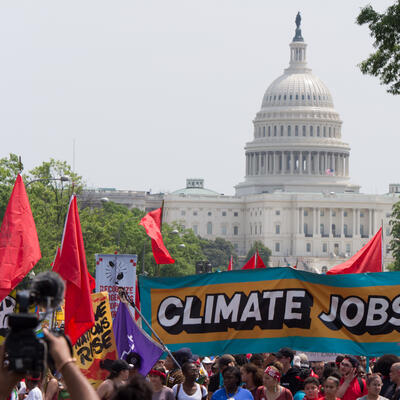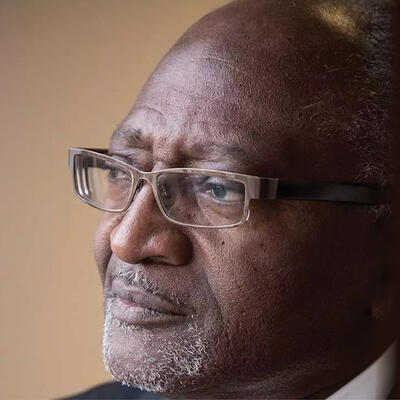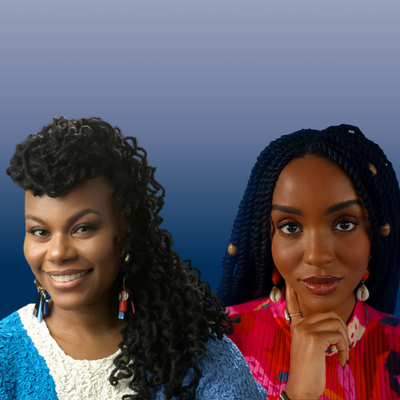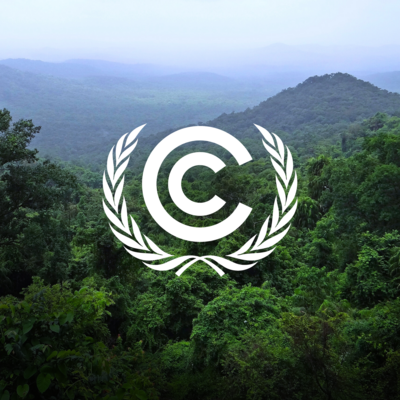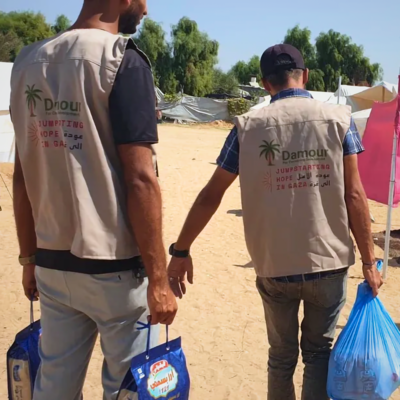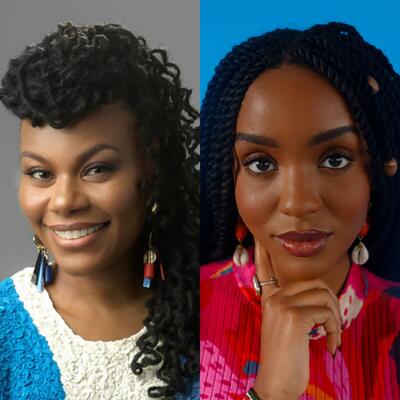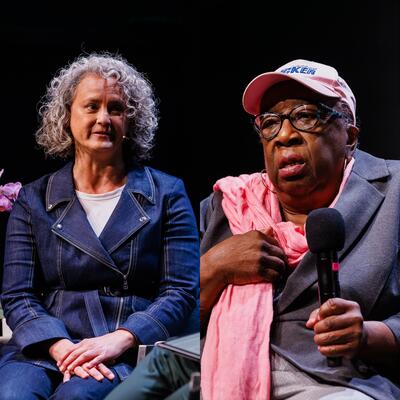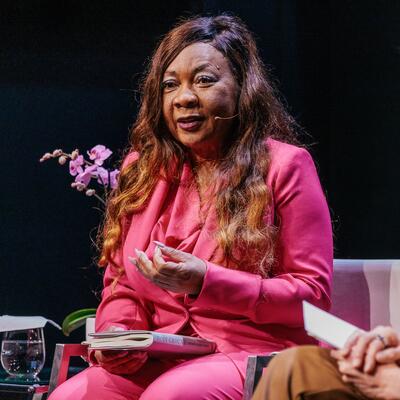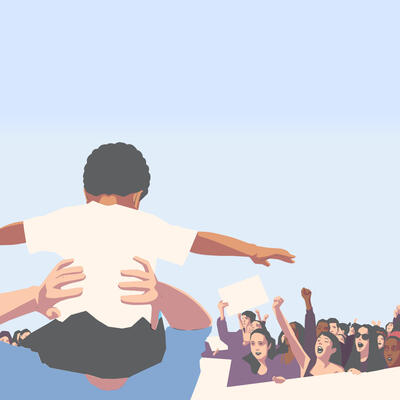
Real Talk: Racism and Climate
Guests
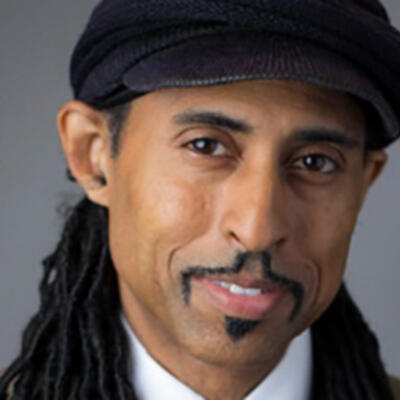
Mustafa Santiago Ali
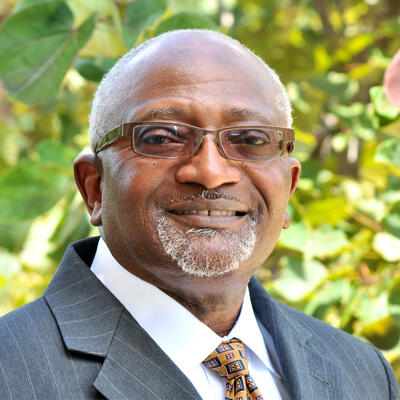
Robert Bullard
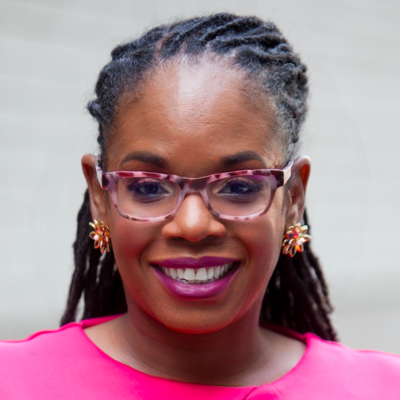
Glynda Carr
Summary
This program was recorded via video on June 11, 2020
The national outrage sparked by the murder of George Floyd has cast a spotlight on systemic racism that has permeated this country for centuries. And for once, it’s gotten everyone’s attention.
“To see those televised lynchings by police today, it struck a nerve,” says environmental justice pioneer Robert Bullard. “And it’s hit a nerve among a lot of people, not just black people -- a lot of people.”
Indeed, many white people have only recently been made aware of how racism is embedded in every aspect of American society - racism that’s been glaringly obvious to people of color their whole lives.
Environmental efforts are no exception. Air pollution, severe weather and the economic upheaval brought on by climate change impact black and minority communities first and worst. Refineries, power plants and dumps are often located in lower-income neighborhoods of color; those same neighborhoods also often lack green space and stores with healthy food. Yet theirs are the voices often left out of policy responses and market solutions.
“We want economically thriving, educated and healthy, safe communities,” says Glynda Carr, founder and CEO of Higher Heights for America. “And part of the reason why we haven’t been able to achieve that is because of the ability not to have brave conversations about the inequalities in this country.”
Carr is very much a believer in meeting those brave conversations head on.
“Being uncomfortable is the way that we have real conversations,” she continues. “And I think that is what we ought to be doing in this moment; to be able to listen...but also to be able to be receptive to conversation and the grace for people to evolve around a race conversation.”
Mustafa Santiago Ali now works for the National Wildlife Federation, but he started his environmental justice career at the Environmental Protection Agency under the first President Bush. He says that that agency often fell short when it came to addressing the needs of communities of color.
“Anytime policy is being created it should be coming from local people, local communities, local organizations,” he says, “And the most important thing was that community speak for themselves.
“So if we can get politicians whether on the federal level or the state level or the county or the local level to understand that basic concept, we would stop wasting money and we would stop making mistakes by creating policy that is not meeting the needs of everyday people.”
Ali says that, despite the perceived gulf between environmentalists and the racial justice movement, there is common ground to be found.
“That same pollution that is killing black and brown folks in the city is the same pollution that is impacting the national parks that you say that you care about so much,” he points out. “So you should be standing in solidarity.”
Related Links:
Higher Heights for America
National Wildlife Federation – Equity and Justice
Dumping in Dixie: Race, Class and Environmental Quality (Robert Bullard)
16 essential books about environmental justice, racism and activism (EcoWatch)
Full Transcript
Greg Dalton: This is Climate One. I’m Greg Dalton.
Greg Dalton: The national outrage sparked by the murder of George Floyd has cast a spotlight on systemic racism that has permeated this country for centuries. And for once, it’s gotten everyone’s attention.
Robert Bullard: To see those televised lynchings by police today, it struck a nerve. And it’s hit a nerve among a lot of people, not just black people, a lot of people. [:10]
Greg Dalton: One area of racial justice that has long been ignored? The fraught relationship between environmentalism and communities of color. But there is common ground to be found.
Mustafa Santiago Ali: That same pollution that is killing black and brown folks in the city is the same pollution that is impacting the national parks that you say that you care about so much. So you should be standing in solidarity. [:12]
Greg Dalton: Real talk about racism and climate. Up next on Climate One.
Music: Out
Music: In
Greg Dalton: Can the climate movement overcome America’s systemic racism? Climate One conversations feature oil companies and environmentalists, Republicans and Democrats, the exciting and the scary aspects of the climate challenge.
Greg Dalton: Many white people have recently become aware of how racism is embedded in every aspect of American society - racism that’s been glaringly obvious to people of color their whole lives. And environmental efforts are no exception. Air pollution, severe weather and the economic upheaval brought on by climate change, impacts black and minority communities first and worst. Refineries, power plants and dumps are often located in lower income neighborhoods of color; those same neighborhoods also often lack green space and stores with healthy food. Yet theirs are the voices often left out of policy responses and market solutions.
Glynda Carr: We want economically thriving, educated and healthy, safe communities...And part of the reason why we haven’t been able to achieve that is because of the ability not to have brave conversations about the inequalities in this country. [:14]
Greg Dalton: Glynda Carr is president and CEO of Higher Heights for America, an organization she founded to grow Black women’s political power. For those who have long been working on climate justice, it’s been an uphill battle to get people to understand the needs of communities of color. (The first step is to listen).
Mustafa Santiago Ali: Anytime policy is being created it should be coming from local people, local communities, local organizations...and the most important thing was that community speak for themselves. So if we can get politicians...to understand that basic concept, we would stop wasting money and we would stop making mistakes by creating policy that is not meeting the needs of everyday people. [:20]
Greg Dalton: That’s Mustafa Santiago Ali, Vice President of Environmental Justice at the National Wildlife Federation. We’re also joined by Dr. Robert Bullard, distinguished Professor of Urban Planning and Environmental Policy at Texas Southern University in Houston. Dr. Bullard is widely recognized as the father of environmental justice and is a recipient of many awards including this year’s Stephen Schneider Award for Outstanding Climate Science Communication, presented by Climate One.
Greg Dalton: We begin by connecting with our breath. People breathe about 25,000 times a day and we usually take it for granted. COVID-19, which attacks the lungs, and the suffocation of Eric Garner and George Floyd at the hands of police, have focused on breath and given it new meaning. Mustafa Santiago Ali explains why.
PROGRAM PART 1
Mustafa Santiago Ali: You know, breath is life. From the moment that we come from our mothers, the first thing we do is take that breath, which brings life into our bodies in this world. And unfortunately, we know that so many of our communities, you know, black communities, brown communities, indigenous communities, sometimes even lower wealth white communities don't have that opportunity. And they don't have that opportunity because there is intentionality by folks both in the past and in the present in limiting folk’s ability to be able to take that breath. And that’s why in this moment we also talk about the racism, systemic racism, plays into that paradigm into that set of actions. And hopefully we will unpack what that looks like and how we can rectify the situation that has been perpetuated by both politics, policy and in everyday folk’s lives.
Greg Dalton: Glynda Carr, when you take a long, deep breath how does it affect you given what everything has been happening in our country lately about breathing?
Glynda Carr: So recently a colleague of mine shared a song that her mother-in-law wrote and it was a song in tribute to George Floyd. And in that she says “I can't breathe. Let me breathe. Hear me.” And I think those three short phrases shares a little bit about how African-Americans are feeling in this moment how black and brown communities are feeling in this moment and frankly how the world is feeling. You know the notion of being able to be free to take a full breath and use this moment for those who can to fill up and feel our democracy in a way that can envision a pathway forward. It is a luxury unfortunately in our society to breathe. The attack on black and brown lives and our ability to not only breathe because we’ve been constrained by institutional racism for centuries. Our ability to breathe when we continue to see police brutality choking black lives. Our ability to breathe so we can imagine a world rid of pollution, rid of racism, rid of politically toxic racially divisive time that we’re living in. But in that moment when we breathe, there's clearly about a pathway forward.
Greg Dalton: Dr. Bullard, your thoughts, you’ve been writing books with very prescient titles, Dumping in Dixie, The Wrong Complexion for Protection. When you think about breathing and the work you've done what really goes in your mind and your heart?
Robert Bullard: Well, you know, the first thing I think of is that breathing is natural and what’s unnatural is when breathing can be hazardous to your health. And for too long our lives have been snuffed out and somehow demeaned because we have not been allowed to breathe freely. And I think this whole idea of the right to breathe clean air is a basic human right. And when you start taking away that right to breathe you’re taking away humanity and when you're taking away just every day 24/7 of violence of dumping pollution into neighborhoods through smokestacks and families are waking up 2:30 in the morning because some accident because of plume that is rushing through their neighborhoods and they don't know if -- and they're told to shelter in place and they don't know if they’re going to live or die. That's violence. It’s the same kind of violence that we see the police violence that's snuffing out black lives and killing people and creating this mental stress and trauma. When we see those videos daily and running looping, looping, looping that is causing trauma, you know, which is PTSD. That kind of violence has taken its toll. And I think everybody knows it now these demonstrations are really showing that not just in this country around the world that this is unjust this is barbaric and we need to stop it right now.
Greg Dalton: Mustafa Santiago Ali, I was recently listening to an interview with Brian Stevenson and he was talking about how going to other countries, particularly I guess Germany how they, you know, is actively encourage people to learn about the Holocaust. So there’s this national reckoning across generations. And it seems like this country hasn't had that reckoning yet. I’d like to hear your thoughts on whether America has really put this legacy of racism front and center like it should have.
Mustafa Santiago Ali: Well, I think America is afraid to because if you put it front and center. If you integrate it into the educational system as a part of our history, both the dark days and where we are in this present moment then you have to do something about it. And it's very difficult for America to admit that it was a part of genocide for our indigenous brothers and sisters. It's hard for America to also talk about snatching the lives of Africans and bringing them to this country so that you can have free labor. It's difficult for our country to also focus on the fact that they brought Chinese brothers and sisters over here to build the infrastructure on the railroads and then turned their back on them after that and ostracized them. So for America to truly be able to highlight the injustices the systemic racism that we’re talking about today would then mean that you also have to figure out a way that you are going to address both those past and present injustices that continue to happen. And that may come in the form of reparations that may definitely come in the form of making sure that there is legislation both on the federal and the state level that rectifies those situations. And that also means that there has to be resources placed into that overall equation because words without resources have little meaning.
So I think it’s difficult for our country up to this moment to be able to actually honor the lives that have been sacrificed so that this country could be in the positioning that it is. But I will also say that this is a new moment this is a new time and young people and many others are refusing to have the 21st century look like the previous centuries. So we have to see what that's going to actually look like. And of course, mobilization building coalitions and many of the other aspects that are necessary for true change to happen will have to all come together.
Greg Dalton: Glynda Carr, the climate and environmental conversation is often separate from the conversations about housing, jobs, equity, those sorts of things. How do you see them as connected, I mean, racism is everywhere and carbon pollution is everywhere they’re both systemic problems but they’re often thought of as separate.
Glynda Carr: At the end of the day, you know, we will continue to have siloed conversations. I do think for us to step into this moment where we can truly reimagine an America we can all believe in, we have to look at the intersectionality of this moment. And at the end of the day, black women want what white women want who want what black men want who want what white men and our other communities of color what we want economically thriving, educated and healthy, safe communities. And if we can meet, you know, in the intersection to be able to talk about the nuances of that and why we haven't been able to achieve that. And part of the reason why we haven’t been able to achieve that is because of the ability not to have brave conversations about the inequalities in this country.
And so what has happened, you know, with the I think the intersection when you talk about meeting at the intersection in 2020. We are moving towards a presidential election in November during one of the most politically toxic and racially divisive times. We are in 2020 with the backdrop of COVID-19 and like literally breaking open the racial disparities on mainstream TV and our social platforms about how COVID-19 is impacting communities of color. Then insert a continued drumbeat on the attack of blackness and then insert and yet another conversation about the Amy Coopers of the world racializing the ability for a black man to walk in Central Park as a birdwatcher that that all of those pieces have now hit an intersection that we can truly have conversations about how do we talk about the intersectionality of raising, you know, raising the next generation of whole Americans. And that has to be a connection about my ability to economically thrive, my ability ensure that my children are educated to imagine a world where we are all safe and that it's not just the color of our skin that dictates our ability to walk down the street and not be afraid of not being able to come home.
Greg Dalton: Mustafa Santiago Ali, you used to work for the Hip Hop Caucus. There was a lot of talk about how Joe Biden needs black voters to win in 2021. What do you see there that connection and does it connect to the issues we’re talking about environment and climate or they’ve been pushed aside?
Mustafa Santiago Ali: No, I don't think they’ve been pushed aside at all. So first let's say for anyone who is garnering to have the vote, especially of the African-American community, then you have to be authentic in the work that you have done in the past in the present and actually framing out what your future is going to look like. So if you're not willing to do that then you’re gonna have a very difficult time in gathering those votes that are so critical. The beauty of working at the Hip Hop Caucus and shout out to Rev Yearwood for helping to actually found that entity which was transformational in its moment when it was founded and of course today is needed more than ever, is that you have to reach young people. And one of the ways and being able to accomplish that of course is through the arts and making sure that activists and artivists who are actually engaging learning about the issues and then sharing that with masses is a critical component that so many organizations do not get right. And then they wonder why young people they wonder why people of color are not connected to their work. Well one, if you don't look like the people working in your institution then you got some work to do.
But besides that you actually have to meet people where they are. Rev and I used to say that our work was from the streets to the suites so we made sure that we were connecting, you know, with all the various folks that are out there. And you know I've shared this before many of us who are here on this call tonight, you know, we know hundred sometimes thousands of incredible scientists who are out there who are doing important work. And if they say something you might get 10% of the people to pay attention to what they're saying. But Beyoncé says something and Jay-Z says something and Chance the Rapper says something, you know, and a number of other folks are sharing information from an authentic space and they can relate to it. So that's why organizations like the Hip Hop Caucus and even on a broader construct, you know, us utilizing and honoring the artists who are speaking from their hearts they’re speaking from their souls. That's what connects with people. That's what motivates people. And I think that’s something also that you see many politicians are clamoring to have but, you know, you gotta come from the places you got to spend time in the places if you want your message to actually resonate in a real and authentic way.
Greg Dalton: Dr. Bullard is Joe Biden connecting in a passionate and authentic way? Some people think he's lost a step, doesn't quite have the energy that he used to have and is he connecting with African-American voters?
Robert Bullard: Well, let me just put it this way. Black people in this country have never put all of our hope in presidents saving us. And have never put all of our hope in white people saving us. And I think it's important that we understand that any politician that's coming for our votes not only need to be authentic. They need to have a track record and they need to bring people who are from those areas that they want the votes from and not white people telling us how it feels to be black. The experts that are out there can all tell, you know, a white male can tell on a TV program what a black woman feels. That kind of paternalism and racism and classism needs to stop.
So let me just answer your question. I think the fact is that black people are responsible for dragging in South Carolina, dragging Joe Biden across the finish line. Black people are responsible for moving the Democratic Party as far along that it is right now. So let's be clear, when we talk about developing a program of lift every voice a black agenda for America then it needs to be more than a 20-page or 30-page term paper. And so we need real authentic proposals and organizations that have come to the table. That’s why a group of us, who have been working on environmental justice and environmental racism, transportation, housing, energy, food security, health, etc. came together and we have reformed the National Black Environmental Justice Network. That we are pushing forward an agenda. We have developed a policy papers, strategies and the idea is that if we have a black agenda for America that’s coming out of the Biden team then that agenda needs to be developed by and for and presented to that team. And that the way that we move the agenda forward is inclusion not sloganeering what real programs.
And I think we have enough young people, old people and people who are concerned about this crisis that we're in right now; 80% of America thinks that we are out of control. Every social movement that has been successful in this country has had students and young people. I spent my life training educating young people and students. And so this whole idea of getting the word into those elected officials and it starts at the city council, county commissioner, the legislature, the governor. Everything should not be put just the 100% of our energy just on the president election. We have to go down ballot, and organize, and mobilize, and educate. There’s no substitution for organizing. We used to be the best organizers in the world and people learn from us, took our playbook and now they are mimicking what we used to do. We have to get back to what we used to do, is out-organize everybody. Now that’s my spiel for today.
Music: In
Greg Dalton: You’re listening to a Climate One conversation about racism and climate change. Coming up - addressing the need for more diverse leadership in environmental efforts.
Mustafa Santiago Ali: When we look at all the major green groups we don't see an African-American or Latinx person leading any of those. But the Heritage Foundation,they actually have an African-American woman who runs that...if they can do it, how is it that these organizations that focus on environmental conservation and climate can't do it? [:20]
Greg Dalton: That’s up next, when Climate One continues.
Music: Out
Greg Dalton: This is Climate One. I’m Greg Dalton, and we’re talking about creating a more inclusive climate movement in a racially polarized America. My guests are Dr. Robert Bullard, professor at Texas Southern University, Glynda Carr of Higher Heights for America, and Mustafa Santiago Ali of the National Wildlife Federation.
Greg Dalton: Before joining the NWF, Mustafa worked at the U.S. Environmental Protection Agency for twenty-four years. But he has been outspoken about the fact that when it comes to meeting the needs of communities of color, the EPA has fallen short.
PROGRAM PART 2
Mustafa Santiago Ali: I've often said that anytime policy is being created it should be coming from local people, local communities, local organizations and should be evaluated by those same organizations to make sure that it's meeting the needs. And we should not necessarily be having people have to come to Washington. You should be in their communities in their meetings listening, that’s the first thing. And then sitting down with folks and following through with the translation of what they are asking for. And that is true whether we’re in Appalachia, we’re in the Rust Belt we’re on the Gulf Coast no matter where we are, we have to make sure that that’s actually happening. And I think it doesn't matter what administration it is, you know, folk sometimes fall short. Now of course this administration the words falling short does not even begin to equate, you know, the lack of understanding vision and just the basicness that is needed just for survival. But yes, you know, we have to make sure that we are honoring the voice of the communities.
Dr. Bullard and many others when I was coming up, I always remember sitting outside listening to the meetings they were having. And the most important thing was that community speak for themselves. So if we can get politicians whether on the federal level or the state level or the county or the local level to understand that basic concept, we would stop wasting money and we would stop making mistakes by creating policy that is not meeting the needs of everyday people.
Greg Dalton: Carter Roberts is CEO of WWF one of the largest conservation organizations in the world with annual revenues of $300 million. After the national response to George Floyd's murder by police he held an all staff meeting to discuss the response of the organization which was founded by European monarchs. I asked him what he heard at that meeting.
[Begin Playback]
Carter Roberts: Our African-American leaders told stories they’ve never told in public before like that. That gave voice to what it was like to have a son or a husband or a nephew that you worried about every day. And they gave voice to the injustice that they face every day. And the response of our entire staff was a tidal wave of conviction that we need to do more to address that systemic justice.
I grew up in Atlanta in the city of Martin Luther King, and Andrew Young, and Ralph Abernathy. And I thought we had made more progress than we have. I’ve led an organization where we have devoted ourselves to working with indigenous people in communities in far-flung places like the Congo or Namibia, or Indonesia or Nepal and Bhutan or here at home in Alaska with tribal corporations and in the Northern Great Plains with tribes and ranchers. But it was clear to me we have not done enough with that most unique of American narratives, and experiences, and tension and roots which is the African-American experience. So, we have the largest social media presence of any environmental group and the largest brand.
Greg Dalton: Yes. And I think of the panda bear when you mentioned WWF for some reason I think of Prince Charles---
Carter Roberts: Yeah, thanks a lot. If we sound like an elite group of people saving fuzzy animals, but, you know, our mission has evolved over time. Our mission now is to build a future in which people and nature both flourish and the power in our organization is devolved to local offices. And, um, uh, that are led by local people, uh, all over the world.
Greg Dalton: Alex Ohanian, who is married to Serena Williams resigned from the board of Reddit, a company that he cofounded and encouraged the board, to place a black person in his place. He also donated $1 million to Colin Kaepernick’s, Know Your Rights Camp. Is it time for some white people on environmental boards to step off, and say replace me with a person of color?
Carter Roberts: I think it's time for white people like myself to ensure that the voices of African-Americans, people of color, indigenous communities are heard. And if that means stepping down from the stage that you're on and insisting that someone else take your place and I think it means boards to look in the mirror and see everything they need to do to make sure those voices are heard. I think this begins with listening.
[End Playback]
Greg Dalton: That was Carter Roberts, CEO of WWF. Dr. Bullard, I’d like to hear your response there to basically saying they overlooked people in their own backyard.
Robert Bullard: Well, you know, we have been saying that for decades. And educating students I taught at big white schools and I taught at historically black universities. And I encourage young people to do study abroad which is very important, but I also encourage them to explore the possibilities of what's on across town. And I think too often we have overlooked those issues that are close to home and somehow think that America has somehow overcome many of the issues that are being dealt with abroad such as poverty and hunger and looking at the issues of political prisoners, etc. The fact that we have been also in our environment justice movement have been talking about people speaking for themselves and developing resources that will have the capacity for people to speak for themselves. And we've really chastised a lot of these large green groups or they used to be in 90s we call them the Big Ten for sucking up all the green dollars from private foundations and supposedly doing the work for everybody. But we know the work that gets done in a lot of communities of color is done by communities of color, indigenous communities that get very little share of the dollars.
The studies done in 2002 people of color in environmental justice group got 4.5% of the green dollars. In 2020 I think it’s 15%. In 25 years this country will be majority people of color, we shouldn't wait to 2045 for us to transition to do justice in terms of not just diversity in terms of these large organizations on the boards and the staffs that’s okay. But we also should talk about diversifying the dollars; where the dollars flow should be where the needs are and build in those capacities the people of color groups and indigenous groups and women of color groups, etc. that's how you make change. And that's what we have been saying for a long time. Green 2.0 looking at diversity in the board rooms and then the board, etc. that's good. But we also be looking at with the money as folks will say on the street “where the money at” “who’s getting them dollars?” and how that flows. Makes a difference.
Greg Dalton: Mustafa Santiago Ali, a report by Bloomberg last year found that the fossil fuel industry is much more ethnically diverse than the clean energy sector. The solar industry for example, has a quarter million workers and about 75% of them are white. A recent academic study found lower adoption of rooftop solar and community of color even after adjusting for income and homeownership. What’s going on there?
Mustafa Santiago Ali: You know, there's a saying if you gonna talk about it be about it. And, you know, it’s really interesting that and I’ve said this before and I've had some pushback from some folks, you know, it’s not only workers inside of this new green, clean economy. People love for us to be focused on that and that is an important conversation. The other part of it is ownership because ownership then means that you can prioritize, you can make the right decisions and you can make sure that your services and your resources can then be anchored in certain communities and can revolve around inside of those communities. And that is a missing part of this conversation. It’s almost like the conversation that we have and Dr. Bullard touched on it a little bit there. When we look at all the major green groups we don't see an African-American or Latinx person leading any of those. But the Heritage Fund or the Heritage Foundation, they actually have an African-American woman who runs that.
So I don't agree with the policies that they support and they move forward on. But if they can do it how is it that these organizations that focus on environmental conservation climate can't do it?
And then of course we flip the coin over and we look at the clean economy and we don't see folks doing the right things yet in that space. It's important the work that can come out of there is important us, you know, transitioning from fossil fuels is important. But it also as important that we don't take this, you know, a paradigm from one impacting negative side and then transfer that to the green side. So we gotta make sure that we don't continue the sins of the past, if I can say it that way.
Greg Dalton: Glynda Carr, on that point about the Heritage Foundation. Condi Rice is the new head of the Hoover Institute at Stanford University, very bastion of conservative thinking going back for decades. How do you feel about that? Is there an expectation that women of color are always progressive are you happy to get conservative women of color in power too?
Glynda Carr: Black women are a monolithic voting bloc, we’re not a monolithic leadership. And for me a diverse decision-making table, regardless of where it fits in my political ideology still makes better decisions. And so being able to ensure that if we're looking at this just from a two political idealism spectrum conservative to progressives. We need to be pushing both spectrums to ensure that their leadership looks diverse and looks like America. And then for me is that I have no problem being able to be in a brave conversation where we push our counterparts to be better on issues or center our communities in those issues. So no, I think that we should ensure that each decision-making table is diverse so that she still has a unique experience as a black woman in America that she's bringing to a table that without her leadership be void of a discussion about race and gender.
Greg Dalton: And another person that help campaign Letitia James, the first black woman to be a New York Atty. Gen. She took on Exxon Mobil and lost. Tell us about her and some of the other new crop of leaders you’re supporting. We saw a very different congressional class in 2018.
Glynda Carr: Behind my shoulder is Shirley Chisholm, the first black woman to ever be elected to Congress in 1968. So we’re 51 years since she became the first black woman to serve in that body. She went on, you know, four years later to literally 48 years from like today she was preparing for the 1972 Democratic convention where she would go and her name be entered into nomination from the floor. So there’s been gains around black leadership since then, and gains for black women. But the 23 million black women in this country are underrepresented and underserved. And the strive that we've seen since Shirley Chisholm is in through Higher Heights and our work with the Center for American Women and Politics, you can't actually build a blueprint for if you don't know where you've been san copa, right. And so when you look at black women's leadership in 2014, there was only two black women elected in serving as mayors of top 100 cities.
So enter 2020 and what we see on the national stage are seven black women leading major cities and frankly being more progressive on how they are approaching COVID-19 than their counterparts across the country. In our country's history we only had 15 black women serve as statewide executives. Letitia James being one, right. And here is a woman who is using her position as a New York State Atty. General to actually push innovation and progressive policies that will be implemented nationwide. And so she again entered COVID-19 recognizing the racial disparities both from a health perspective from an economic perspective and I think is leading well. And to circle right back toward Shirley Chisholm. In 2018, we elected the largest number of women ever to serve in Congress, including the largest number of black women to ever serve in that body. We now have 25 black women serving in Congress. One African-American woman in the U.S. Senate, which is Kamala Harris, we’ve only elected two in our country’s history; in 1972 Carol Moseley Braun and now Kamala Harris and we have 24 black women serving in the House of Representatives.
But what's unique about the freshman class is they were, their leadership was built for time as this. So who did we know that in 2018 we would elect Lauren Underwood, a nurse, who is uniquely qualified to sit at a table as we determine how we are preparing in the intersection of a racial lens around health disparities. Who knew that in 2018 when we sent Jahana Hayes not only a teacher, but the 2016 teacher of the year to serve in Congress that she would be sitting at a table that as we envision how we homeschool children across the country. That we would ensure that there would be a clear discussion around the inequalities of broadband and technology for our children. So I think the black women, you know, that are serving in Congress are uniquely using their voices and their leadership in a way that centers the communities of color in a way that talks about the intersectionality of the very issues that we are at the, you know, unfortunate bottom of every indicator. At the end of the day the road to 2020 is built on the engagement of black voters. And at the center of the over engagement of black voters are black women. When we fire up a black woman she doesn't go to the polls alone, she brings her house, her bloc, her church, and her sorority that is the tradition of what my mother did until the day she died she called me and my brothers to ensure that we voted in election, right. And we are more than ever leaning into we want our return on our voting investment and that is in the form of policies that directly impact black women, our families, and our communities. And we are absolutely continuing to claim seats at decision-making tables, so that we can create a country and move it to higher heights.
Music: in
Greg Dalton: You're listening to a conversation about race, politics and environment in America. This is Climate One. Coming up - getting outside of our comfort zones.
Glynda Carr: Being uncomfortable is the way that we have real conversations. And I think that is what we ought to be doing in this moment; to be able to listen...but also to be able to be receptive to conversation and the grace for people to evolve around a race conversation. [:15]
Greg Dalton: That’s up next, when Climate One continues.
Music: out
Greg Dalton: This is Climate One. I’m Greg Dalton. We’re talking about racism in America. My guests are Mustafa Santiago Ali of the National Wildlife Federation, Dr. Robert Bullard, Distinguished Professor at Texas Southern University, and Glynda Carr, CEO and founder of Higher Heights for America.
Greg Dalton:As enlightened as we might think we are as a country, we’re still uncomfortable talking about race; many of us don’t even know what words we should or should not be using. Glynda Carr believes we should meet those uncomfortable conversations head on - and learn from them.
PROGRAM PART 3
Glynda Carr: I am blessed to have been raised by parents that believe that it is okay to have brave conversation. We grew up in Connecticut we always joke around for some people like there are black people in Connecticut. And, you know, although we grew up in a black community we were bussed to an affluent white school districts. I graduated from a high school with less than 10 people of color. And so we found ourselves very early being centered in a very Afrocentric and Caribbean centric family being bussed and our parents being very clear that we had to show our authentic selves. And the way you show your authentic self is allowed there to be grace when someone says something that is offensive and being able to have as my mother would say teachable moments.
I remember in sixth grade myself and two of my closest friends there were three black girls in my fifth grade class and I’m not gonna -- I almost called the man’s name out. Our teacher at the time were doing a family tree and he pulled the three black girls out of the class to tell us we didn’t have to do the family tree. Because he assumed that we couldn't do a family tree as descendents of African and those who were brought here from slaves. So of course all of our parents took it upon themselves to actually do the family trees for us. It was the best family tree ever. And for them it’s like, no. Here’s an opportunity for you to know the diversity of our families. But he did actually thought he didn't want us to be uncomfortable it was in fact he didn't want his white students for him to be uncomfortable. For at the end of the day we could only stand in front of that class and proudly say we were descendents of slaves that was the ability for in sixth grade to understand that being uncomfortable is the way that we have real conversations. And I think that is what we ought to be doing in this moment; to listen as you said but also to be able to be receptive to conversation and the grace for people to evolve around a race conversation.
Greg Dalton: Dr. Bullard, what do you say to people who would like to be a white ally that's a term that we've heard a lot about lately and how the complexion of the protest has changed. Lot of younger people, younger white millennials for example, what do you say to someone who wants to be a white ally and isn't sure what language to use or how to go about it?
Robert Bullard: Well, you know, the fact that coming out of the environmental justice movement, and civil rights movement we don’t ask white people to check their skin color at the door. But we do ask them to come with a lens that's a racial justice and equity lens. The fact that the meeting that we had at the University of Michigan in 1990 was pulled together by Bunyan Bryant and Paul Mohai an African-American and a white guy. And so the idea that we have always had allies, but the fact is that when we talk about the issues around justice, fairness and equity, there's no one group that will have a monopoly on that.
So how we build allies is to come to the table with being authentic, coming there being sincere and coming to work. And I think this is true with young people today and as I said every social movement has had successful movement has had young people and students. And young people, millennials for example today outnumber my generation, baby boomers. And then you start going below the millennials younger than the millennials you find this mobilization this awareness. And because of iPhones and the iPads and you enable to, you know, the social media to get information access to Google something real quick. The amount of information that young people have at their disposal in real time they can truth - what do you call it when you are testing a lie? They can fact check instantly and really show, no that's not true here are the facts.
And so building allies building that intergenerational collaborative and understanding that when we are working together as a collective we're unstoppable. And those of us who’ve been doing this a long time if again, if we look at this race as a not a sprint, but more of a marathon and as a matter of fact it’s a race that doesn't really exist, a marathon relay. You run your 26.2 miles and then you pass the baton off to the next generation to run it. Those young people that are out there marching, demonstrating and protesting and showing their bravery during this time of coronavirus. During this time when they could know that they could get beat up, brutalized or killed by police that that kind of sheer bravery, but also standing for something. That's who we were in the 60s in terms of being fearless. There’s dogs, firehoses, going to jail, threatened with your life. But to see those televised lynchings by police today it struck a nerve. And it’s hit a nerve among a lot of people not just black people, a lot of people. And I think this is that teachable moment that Glynda was talking about. That we have to use that teachable moment to teach and people who are open to learning and changing that to me that's the optimism that I have for what’s going on right now.
Greg Dalton: Mustafa Santiago Ali, you work with the National Wildlife Federation, which is sometimes called the hook and bullet crowd. You think of a white man in plaid with a shotgun. How are you reaching out to those people to connect on environmental issues and can you talk to them about environmental justice issues?
Mustafa Santiago Ali: Well, you know, we just had a vote at our board meeting and 97% of the board was in favor of the environmental justice movements that we're going forward on. We are the only organization that has a full environmental justice analysis that's taking place for all of its policy programs activities and budgeting decisions. So those are important steps. But, you know, we also got progressives that are part of the base. The 6 million members and you got the good old boys and good old girls who are part of it also. So what I do is I just keep it real with folks. That same pollution that is killing black and brown folks in the city is the same pollution that is impacting the national parks that you say that you care about so much. So you should be standing in solidarity with the folks who are dealing with the initial impacts because you’re getting the secondary impacts.
When we talk about water quality issues we go through the impacts that are happening again in black and brown and indigenous communities and that’s the same pollution once again that is impacting if you're a fisherman. So there is those intersection points that exist you just have to make the decision if you want to stand in solidarity with those who’ve been doing the work for decades or not. And we’re lucky that -- no, we’re not lucky, there is work that has been done by folks long before I ever got there to plant the seeds. So, you know, we are continuing to water those and move forward.
Greg Dalton: Thank you Mustafa. Also for Mustafa, I just wanna ask you, you started on the first environmental justice program at the U.S. EPA under administrator Bill Reilly under the first President Bush. And then you left to I think protest the leadership of Scott Pruitt. What is the status of the environmental justice program now at EPA so much has been devastated in that agency.
Mustafa Santiago Ali: Well, you know, the office of environmental justice which Dr. Bullard and others help to get founded which was the office of environmental equity, you know, used to be a national program office. So just like the office of air the office of water so forth and so on. Now it's been moved over to the administrator's office about three levels down and that sends a clear message. That sends a message that environmental justice is no longer a priority at this institution, but it sends a broader message it actually sends ripples across the federal family because that office also played a role with the interagency working group. So there are 17 federal agencies and departments that have a distinct responsibility for environmental justice. So when EPA does what it does which of course is coming from the White House then it also ripples to these other agencies saying that EJ is no longer a priority issue for us as it was to a degree in the last administration.
So, you know, we have to make sure that we’re getting these types of things in check and especially in the broader context of not just the EPA because these other agencies and departments have much deeper pockets and they have the ability to actually help to address many of these issues in a holistic fashion that are going on inside of our communities.
Greg Dalton: Going to our lightning round. True or false, Dr. Robert Bullard. Having a racist and violent police force in your neighborhood is a lot like having a coal-fired power plant in your neighborhood?
Robert Bullard: True.
Greg Dalton: That’s Bill McKibben for that one. Also, Dr. Bullard. Really, it’s black people who should fear white people given history?
Robert Bullard: Very true.
Greg Dalton: Mustafa Santiago Ali, what comes to mind when I say 1619?
Mustafa Santiago Ali: Slavery.Greg Dalton: Glynda Carr, when I mention Angela Davis?
Glynda Carr: Powerful.
Greg Dalton: Dr. Bullard, what comes to mind when I say Ida B. Wells?
Robert Bullard: Fighter.
Greg Dalton: Investigative journalist educator an early leader in the Civil Rights Movements. Glynda Carr, what comes to mind when I say defund the police?
Glynda Carr: Innovative.
Greg Dalton: Dr. Bullard, what's the first thing that comes to mind when I say Colin Kaepernick?
Robert Bullard: One word, it's hard. Hero.
Greg Dalton: Alright. Thank you for getting through the lightning round here on Climate One.
We’re going to end with two questions from YouTube. Both Sharon and Susan asked. “What gives you hope to continue to do this very critical work and do you have hope that we will actually move forward to equality?” Glynda, what gives you hope?
Glynda Carr: I don’t have children of my own but my godchildren give me hope. It is about ensuring that we are leaving an America that is better than what we came for. Like I had the privilege of growing up with four generations of my family. My great-grandmother who was born in 1895 and died shy of her hundredth birthday, Carrie Lee Dickens. We all live in the same community and so she dreamed a dream bigger for me and my brothers that she could've ever imagined, right, that we could have ever imagine. Here’s a woman that didn’t have a right to own property they only had a third grade education, but she knew that she could use her voice and her activism in a way that created a pathway better for me and my brothers. And I'll leave this with you, because you brought her name up, Greg, which was Ida B. Wells. She once said the way you right a wrong is to turn the light of truth on it. And I think that is what we continue to do and strive for.
Greg Dalton: Mustafa, what gives you hope?
Mustafa Santiago Ali: Seeing many different types of people coming together in authentic ways. And seeing people not just utilize words, but actually being willing to put their bodies on the line to make sure that justice becomes a reality that systemic racism ends. It reminds me of the pictures that I've seen, because I wasn't there at the time of the early days of the environmental justice movement in Warren County, North Carolina, when people were literally willing to lay down in the roads to stop trucks from coming into their communities. That level of dedication is the fire underneath of a movement. And I'm just blessed to be alive at this time and to be able to be a part of change that is actually happening.
Greg Dalton: Dr. Bullard, last word on hope?
Robert Bullard: Well, what gives me hope is that the young people that are fearless and willing to commit and risk it all for the sake of justice and dismantling this violent system of racism. And I see that happening right now. And I think this is the time to allow that space and that leadership to transition and transform this country. There’s enough of them to do it and enough of us together to do it.
Music: In
Greg Dalton: You’ve been listening to Climate One. We’ve been talking about racism and the environment, with Glynda Carr, President and CEO of Higher Heights for America, Mustafa Santiago Ali, Vice President of the Environmental Justice at the National Wildlife Federation, and Dr. Robert Bullard, Distinguished Professor of Urban Planning and Environmental Policy at Texas Southern University and recognized as the father of environmental justice.
Greg Dalton: To hear more Climate One conversations, subscribe to our podcast on Apple Podcasts, Spotify or wherever you get your pods. Please help us get people talking more about climate by giving us a rating or review. It really does help advance the climate conversation.
Greg Dalton: Kelli Pennington directs our audience engagement. Tyler Reed is our producer. Sara-Katherine Coxon is the strategy and content manager. Steve Fox is director of advancement. Anny Celsi edited the program. Our audio team is Mark Kirchner, Arnav Gupta, and Andrew Stelzer. Dr. Gloria Duffy is CEO of The Commonwealth Club of California, where our program originates. [pause] I’m Greg Dalton.
Music: Out
